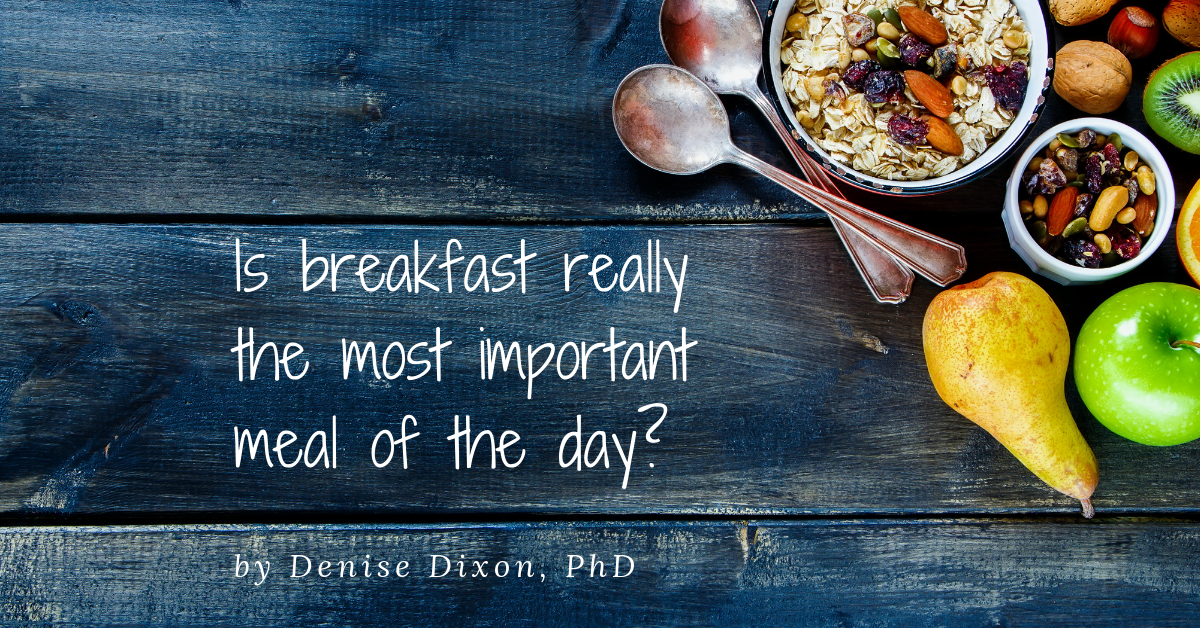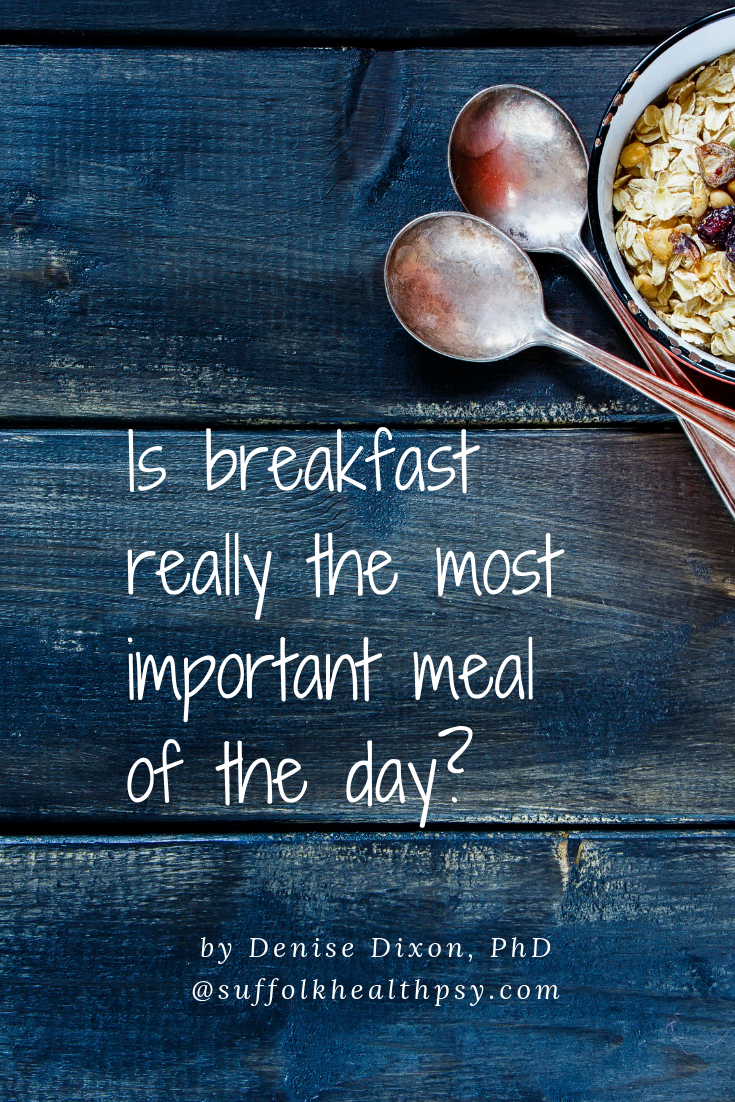Deprecated: mb_strrpos(): Passing the encoding as third parameter is deprecated. Use an explicit zero offset in /home/suffol14/public_html/wp-content/plugins/tweetdis/includes/tweetdis-entity.php on line 190
Deprecated: mb_strrpos(): Passing the encoding as third parameter is deprecated. Use an explicit zero offset in /home/suffol14/public_html/wp-content/plugins/tweetdis/includes/tweetdis-entity.php on line 190
Ah, the great breakfast debate.
Is breakfast really the most important meal of the day?
Or, does skipping breakfast help us to manage our weight?
Some scientists have suggested that the idea of breakfast as the “most important meal of the day” lacks empirical evidence (that is, any real science, to back up this claim), and is nothing more than an over-arching marketing campaign designed to compel consumers to eat more cereal, eggs, meat, and dairy products.
Yet, there is a substantial amount of data to support the importance of breakfast.
The science behind the importance of eating breakfast
Scientists from the Harvard School of Public Health (not too shabby!) found that men that regularly skipped breakfast had a 27% higher risk of heart disease.
Importantly, they found similar health problems in men that regularly ate late at night. This was a large, prospective study (meaning that the study was designed very well!), and the authors carefully accounted for other factors that could have interfered with their findings. (In short — good science!)
Scientists from Columbia University (again, not too shabby!) took this research a step further, by analyzing a decent number of studies (27). They found that people who skipped or delayed breakfast were at greater risk for heart disease; stroke; high blood pressure; elevated blood glucose (sugar) levels; and increase insulin insensitivity.
People who skipped breakfast were also more likely to be obese; have poor nutrition; and be diagnosed with diabetes.
Skipping breakfast has also been associated with blood sugar spikes and impaired insulin response throughout the rest of the day (in persons with diabetes). In fact, irregular eating patterns (e.g., eating at inconsistent times each day, with no real time pattern) has been associated with overall poorer “cardiometabolic” health.
Skipping breakfast and rebound hunger
Let’s not forget about the “rebound hunger” that often happens when we skip breakfast. This prolonged nighttime fast, combined with not reseting the “clock in the gut” (more on this below) is related to a larger than normal increase in “hunger hormones,” such as ghrelin.
Ghrelin (remember Gremlins?) induces us to overeat at our next meal (or all day long), which causes big spikes and dips in blood glucose levels throughout the day. Our pancreas gets burnt out from trying to keep up, which can lead to diabetes.
On the other hand, people who eat breakfast every day have been found with better blood sugar control over the course of their days. They are also less likely to have high cholesterol or high blood pressure.
Overall, breakfast eaters tend to have healthier diets (consuming more fruit, vegetables, milk, and whole grains), than people who do not eat breakfast.
RELATED: An honest & complete Green Chef Meal Kit Review
These findings were compelling enough to prompt the American Heart Association to issue a statement advising against skipping breakfast.
Breakfast eaters tend to keep their weight down generally, compared with breakfast skippers. They are more likely to be physical active.
RELATED: Four fitness apps that you want to download right now!
Interestingly, people with the lowest BMIs also use time-restricted eating, with fasts from 18 to 19 hours. (Fasting signals to the body to start burning stores of fat for fuel. In fact, the body seems to have a hard-wired need to cycle between food intake and fasting). For more on time-restricted eating, click here.
Eating breakfast like a king or queen…
Several studies have found that people who ate their largest meal (“front-loading” their calories) early in the day were more likely to have a lower body mass index than those who ate a large lunch or dinner.
It seems that a person eating the identical meal at different times of day might deposit more fat after dinner, than after breakfast.
Why is that?
In fact, when (an otherwise healthy) person eats a big meal in the morning, his or her blood glucose (sugar) may stay high for one to two hours before coming back to normal. If that same person has the very same meal late at night (when the pancreas is sleeping — for real), not enough insulin can be produced, so her or his blood sugar will stay high for up to three hours.
Eating breakfast to manage (or lose) weight
To demonstrate this, a scientist named Dr. Daniela Jakubowicz, found that front-loading calories resulted in much greater weight loss in overweight women with metabolic problems.
In one of her studies, all of the research participants agreed to restrict their intake to 1400 calories per day. Half of the women were instructed to consume 700 calories at breakfast, 500 calories at lunch and 200 calories at dinner. The other half reversed this order. The meals were approximately the same, regardless of timing.
After 12 weeks, all of the women had lost weight.
Incredible, right?
To understand this better, we return to the most excellent research of Dr. Satchidananda Panda of the Salk Institute for Biological Studies, who researches how our patterns of sleep, physical activity, and eating relates to our circadian rhythms, including his research on time-restricted eating that we discussed in our previous blog.
RELATED: Is sleeping one of the easiest ways to help manage your weight?
Gentlemen (and women, and children), start your engines…
Dr. Panda has found that the body has many different circadian clocks (“a clock in the gut, a clock in the kidney, a clock in the liver”). Each of these clocks contributes to our overall biological rhythm; and each clock is turned off and on at certain times.
Dr. Panda describes the sequence of these clocks turning on and off as akin to stoplights. Just as traffic lights need to work in sync, to keep traffic moving smoothly, our various internal clocks need to remain in sync, to keep our bodies operating smoothly. In order to kick the system in gear each morning, we need to — wait for it — eat breakfast.
Eating breakfast turns on our our digestive system, which then kicks the rest of our systems into gear. As food moves through our system, each organ takes care of it’s job, and then switches into “standby” mode, turning back on when we eat next, and repeating the process, until we eat our last meal of the day.
At the end to the day, after our system has finished working, it runs a series of self-maintenance checks. But we need to keep the system clear of debris for an extended period of time, in order to “cleanse” itself properly. Eating during this “down” time sends the maintenance process off kilter, and decreases system efficiency.
RELATED: Is sleeping one of the easiest ways to help manage your weight?
If we want to optimize our health (including managing our weight effectively), we need to eat during consistent time periods each day. This consistency helps to maintain the synchronicity of our biological rhythms, which can help to prevent metabolic diseases and other chronic diseases related to obesity.
As a result, intentionally timed meals (better — at consistent times from day to day) appear to play an important role in weight control.
As a side (yet very important) note, people who eat “mindfully” (that is, paying attention to each bite of food, really focusing and enjoying their food — the aromas, appearance, textures, sounds produced from biting into food, or sipping beverages), have been shown to be much healthier (and yes, that includes better weight management) overall.
RELATED: An honest & complete Green Chef Meal Kit Review
We are reminded of the old proverb: “Eat breakfast like a king, lunch like a prince and dinner like a pauper.”
(Okay, so I’ll change that to: “breakfast like a queen, lunch like a princess, and dinner like a pauper.” Make that a princess without an eating disorder. But I digress…)
Remember to break your night-time fast with breakfast!
– Denise Dixon, PhD @suffolkhealthpsy.com
The take-home message about breakfast seems clear:
Remember to “Break [your night-time] fast” with breakfast — it really is the most important meal of the day!
Bon appétit!
REFERENCES AND RESOURCES:
Please feel free to click here for links to references for this blog post, and here to access additional links and resources.
UP NEXT: Are vacations one of the best ways to stay healthy?
YOUR TURN:
What do you think about this post? What are your ideas about breakfast? Do you eat breakfast (like a king or queen) every morning?
Do you have a suggestion for a blog post? I’d love to hear from you! Simply click here to tell me all about your idea. Thank you!
Please do not discuss clinical concerns here! Remember, this blog is for informational purposes only. It does not represent a professional relationship between the reader and the author. If you have any clinical concerns, please schedule an appointment, or see your own health care provider. As always if you are experiencing an emergency, please call 911 or proceed directly to your closest emergency room.









0 Comments